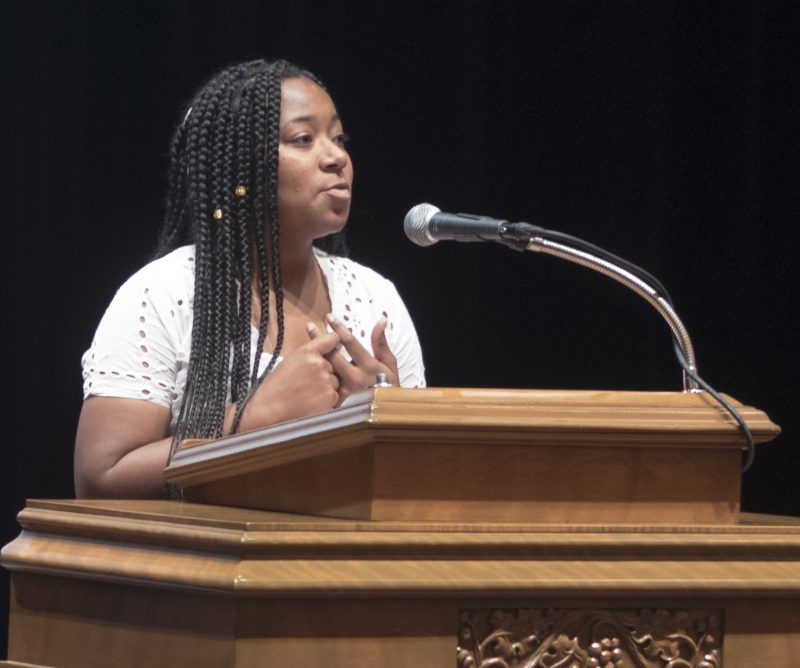Trinity’s annual Triage presentation took place last Sunday in Laurie Auditorium. Triage incorporated lectures by Trinity community members with informative and sometimes humorous videos to educate first-years about topics such as drug use, alcohol policies and consent.
The presentation began with a video of a speech by the father of Robert Foye, a Trinity sophomore who died last spring as a result of experimenting with whipped cream chargers. Foye’s father recounted his son’s life and the positive impact he left on those around him before urging students to have fun in college, but to be aware of the risks of their actions.
Senior Celeste Acevedo and junior Miranda Salazar, co-chairs of the Student Conduct Panel, spoke about student conduct policies.
“Trinity University policies are mostly values based,” Acevedo said. “Our policies ask you to do three things: respect others, so treating others as you would want to be treated; respect the community, so this includes the greater San Antonio community as well as your new Trinity community; and finally, respect property, both ours and the property of others.”
Marijuana and other drugs (including shared prescription medications), physical assault, hazing, weapons and Residential Life-specific offenses, such as littering or smoking on balconies, are not allowed.
Seniors Nico Champion and Jackson Beach presented on Trinity’s Optimal Buzz Policy, which encourages safe drinking. Students caught drinking by Res Life staff can request to blow into a breathalyzer. If their blood alcohol concentration is within the “optimal” area of 0.04–0.06, they can be excused from consequences.
Sophomore Mathilde Le Tacon presented on the Safer Parties Initiative, a national program aiming to reduce alcohol-related tragedies (Le Tacon is a pulse reporter for the Trinitonian). Party hosts are encouraged to follow safe practices such as monitoring alcohol and transportation, knowing who is at the party and using servers trained in Training for Intervention Procedures (TIPS).
LadyStacie Rimes-Boyd, assistant director for programming and marketing, and Damian Caluori, associate professor of philosophy, explained Trinity’s sexual assault policies. Boyd shared basic policies surrounding consent with students.
“By our policy, consent is knowing, voluntary and clear permission by word or action to engage in mutually agreed upon sexual activity or contact,” Boyd said. “Since individuals may experience the same interaction in different ways, it is the responsibility of each party to make certain that the other has consented before engaging in the activity.”
Students watched a video that showed a party scene where a woman becomes drunk over the course of a night and is taken advantage of by a predatory man. This video illuminated the importance of bystander action, showing how various characters — the employee, the roommate, the best friend — could have taken small steps to prevent the assault. The following video informed students about what to do in the event of an active shooting incident.
Junior Kirsten Timco spoke about mental health. Timco had a difficult start to college while struggling with various mental illnesses, but she let students know that they are not alone and that seeking help from Counseling Services or other trained professionals for a mental health issue is OK.
Timco advised incoming students to recognize emotions, stay on needed medications, create a support system, help others and channel emotions in positive ways such as through athletics or art.
“Healing is neither a linear nor fast process, and you’re not alone here,” Timco said.
The program ended on a bittersweet note, as Tuttle recounted the story of Corey Burns, a Trinity student who died in a car crash three years ago. He and friends went joyriding in Olmos Park; as they sped down a hill, their car hit a highway support, causing an accident that killed Burns and hospitalized the three others. Tuttle concluded by reminding students that even small choices matter.
“Live your lives and have fun, but also please remain vigilant,” Tuttle said. “Your family, this community and your friends all care deeply about you, so take care of yourselves and one another and lean on the fantastic people here for help.”
After Triage, Beach shared thoughts on how being a RA for three years has affected his perspective of campus life.
“You go to parties as a college student and you see one side of it. As an RA, you tend to see more of the negative sides,” Beach said. “It’s really important that we talk about these things so that we can mitigate any of the negative consequences that come with college and party culture,”
Sheryl Tynes, vice president of student life, was pleased by the audience response to the presentation.
“I was watching the body language of students in the audience, and they were leaning into it,” Tynes said.
First-years were also impressed.
“I think the realistic and forward thinking approach is quite advantageous for the students as opposed to a fear-based tactic. It helps students be safer because they know people are looking out for them,” said first-year Emily Collins.
Students with questions about Trinity’s conduct policies can email dtuttle@trinity.edu.






